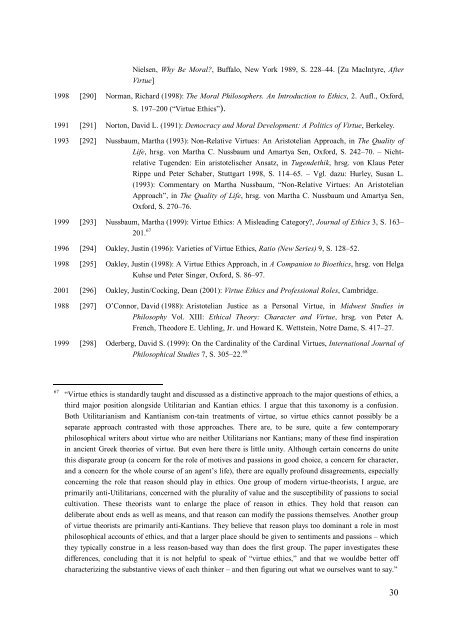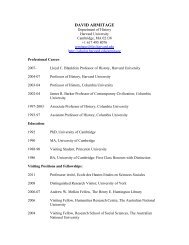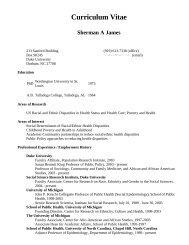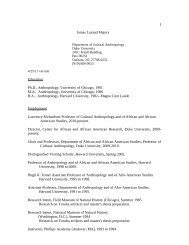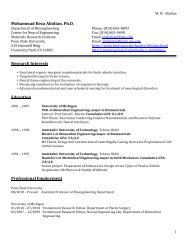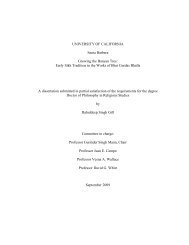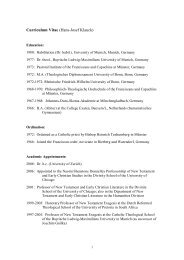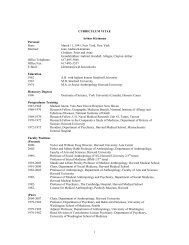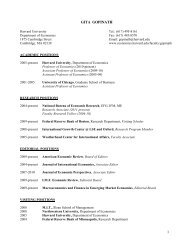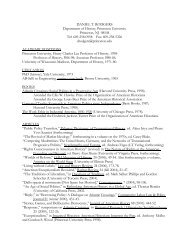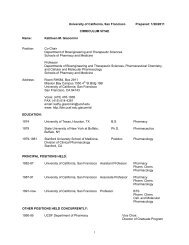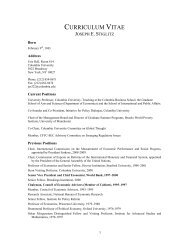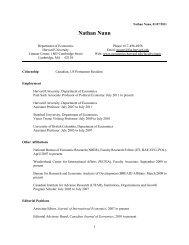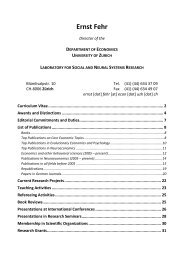Nielsen, Why Be Moral?, Buffalo, New York 1989, S. 228–44. [Zu MacIntyre, After<strong>Virtue</strong>]1998 [290] Norman, Richard (1998): The Moral Philosophers. An Introducti<strong>on</strong> to Ethics, 2. Aufl., Oxford,S. 197–200 (“<strong>Virtue</strong> Ethics”).1991 [291] Nort<strong>on</strong>, David L. (1991): Democracy and Moral Development: A Politics of <strong>Virtue</strong>, Berkeley.1993 [292] Nussbaum, Martha (1993): N<strong>on</strong>-Relative <strong>Virtue</strong>s: An Aristotelian Approach, in The Quality ofLife, hrsg. v<strong>on</strong> Martha C. Nussbaum und Amartya Sen, Oxford, S. 242–70. – NichtrelativeTugenden: Ein aristotelischer Ansatz, in <str<strong>on</strong>g>Tugendethik</str<strong>on</strong>g>, hrsg. v<strong>on</strong> Klaus PeterRippe und Peter Schaber, Stuttgart 1998, S. 114–65. – Vgl. dazu: Hurley, Susan L.(1993): Commentary <strong>on</strong> Martha Nussbaum, “N<strong>on</strong>-Relative <strong>Virtue</strong>s: An AristotelianApproach”, in The Quality of Life, hrsg. v<strong>on</strong> Martha C. Nussbaum und Amartya Sen,Oxford, S. 270–76.1999 [293] Nussbaum, Martha (1999): <strong>Virtue</strong> Ethics: A Misleading Category?, Journal of Ethics 3, S. 163–201. 671996 [294] Oakley, Justin (1996): Varieties of <strong>Virtue</strong> Ethics, Ratio (New Series) 9, S. 128–52.1998 [295] Oakley, Justin (1998): A <strong>Virtue</strong> Ethics Approach, in A Compani<strong>on</strong> to Bioethics, hrsg. v<strong>on</strong> HelgaKuhse und Peter Singer, Oxford, S. 86–97.2001 [296] Oakley, Justin/Cocking, Dean (2001): <strong>Virtue</strong> Ethics and Professi<strong>on</strong>al Roles, Cambridge.1988 [297] O’C<strong>on</strong>nor, David (1988): Aristotelian Justice as a Pers<strong>on</strong>al <strong>Virtue</strong>, in Midwest Studies inPhilosophy Vol. XIII: Ethical Theory: Character and <strong>Virtue</strong>, hrsg. v<strong>on</strong> Peter A.French, Theodore E. Uehling, Jr. und Howard K. Wettstein, Notre Dame, S. 417–27.1999 [298] Oderberg, David S. (1999): On the Cardinality of the Cardinal <strong>Virtue</strong>s, Internati<strong>on</strong>al Journal ofPhilosophical Studies 7, S. 305–22. 6867“<strong>Virtue</strong> ethics is standardly taught and discussed as a distinctive approach to the major questi<strong>on</strong>s of ethics, athird major positi<strong>on</strong> al<strong>on</strong>gside Utilitarian and Kantian ethics. I argue that this tax<strong>on</strong>omy is a c<strong>on</strong>fusi<strong>on</strong>.Both Utilitarianism and Kantianism c<strong>on</strong>-tain treatments of virtue, so virtue ethics cannot possibly be aseparate approach c<strong>on</strong>trasted with those approaches. There are, to be sure, quite a few c<strong>on</strong>temporaryphilosophical writers about virtue who are neither Utilitarians nor Kantians; many of these find inspirati<strong>on</strong>in ancient Greek theories of virtue. But even here there is little unity. Although certain c<strong>on</strong>cerns do unitethis disparate group (a c<strong>on</strong>cern for the role of motives and passi<strong>on</strong>s in good choice, a c<strong>on</strong>cern for character,and a c<strong>on</strong>cern for the whole course of an agent’s life), there are equally profound disagreements, especiallyc<strong>on</strong>cerning the role that reas<strong>on</strong> should play in ethics. One group of modern virtue-theorists, I argue, areprimarily anti-Utilitarians, c<strong>on</strong>cerned with the plurality of value and the susceptibility of passi<strong>on</strong>s to socialcultivati<strong>on</strong>. These theorists want to enlarge the place of reas<strong>on</strong> in ethics. They hold that reas<strong>on</strong> candeliberate about ends as well as means, and that reas<strong>on</strong> can modify the passi<strong>on</strong>s themselves. Another groupof virtue theorists are primarily anti-Kantians. They believe that reas<strong>on</strong> plays too dominant a role in mostphilosophical accounts of ethics, and that a larger place should be given to sentiments and passi<strong>on</strong>s – whichthey typically c<strong>on</strong>strue in a less reas<strong>on</strong>-based way than does the first group. The paper investigates thesedifferences, c<strong>on</strong>cluding that it is not helpful to speak of “virtue ethics,” and that we wouldbe better offcharacterizing the substantive views of each thinker – and then figuring out what we ourselves want to say.”30
2000 [299] Oderberg, David S. (2000): Moral Theory. A N<strong>on</strong>-C<strong>on</strong>sequentialist Approach, Oxford, S. 45–53(“<strong>Virtue</strong>“).2002 [300] Oderberg, David (2002): Review of Hursthouse, On <strong>Virtue</strong> Ethics, Philosophical Books 43 , S.159–63.1996 [301] Okin, Susan Moller (1996): Feminism, Moral Development, and the <strong>Virtue</strong>s, in How ShouldOne Live? Essays <strong>on</strong> the <strong>Virtue</strong>s, hrsg. v<strong>on</strong> Roger Crisp, Oxford, S. 211–29.1993 [302] O’Neill, Onora (1993): Duties and <strong>Virtue</strong>s, in Ethics, hrsg. v<strong>on</strong> A.Phillips Griffiths, Cambridge, S. 107–20.1996 [303] O’Neill, Onora (1996): Kant’s <strong>Virtue</strong>s, in How Should One Live? Essays <strong>on</strong> the <strong>Virtue</strong>s, hrsg.v<strong>on</strong> Roger Crisp, Oxford, S. 77–97.1996 [304] O’Neill, Onora (1996): Towards Justice and <strong>Virtue</strong>. A C<strong>on</strong>structive Account of PracticalReas<strong>on</strong>ing, Cambridge. – Tugend und Gerechtigkeit: eine k<strong>on</strong>struktive Darstellung despraktischen Denkens, Berlin 1996.2004 [305] O’Neill, Onora (2004): C<strong>on</strong>sequences for N<strong>on</strong>-c<strong>on</strong>sequentialists, Utilitas 16, S. 1–11. 69 – Zu[127].1998 [306] Paul, Ellen Frankel/Miller, Jr., Fred D./Paul, Jeffrey (Hrsg.) (1998): <strong>Virtue</strong> and Vice,Cambridge.1984 [307] Pence, Greg (1984): Recent Work <strong>on</strong> the <strong>Virtue</strong>s, American Philosophical Quarterly 21, S. 281–97.1991 [308] Pence, Greg (1991): <strong>Virtue</strong> Theory, in A Compani<strong>on</strong> to Ethics, hrsg. v<strong>on</strong> Peter Singer, Oxford,S. 249–58.1992 [309] Perry, Michael J. (1992): <strong>Virtue</strong>s and Relativism, in <strong>Virtue</strong>, Nomos 34, hrsg. v<strong>on</strong> John W.Chapman und William A. Galst<strong>on</strong>, New York, S. 117–31.6869“This paper is a detailed study of what are traditi<strong>on</strong>ally called the cardinal virtues: prudence, justice,temperance and fortitude. I defend what I call the Cardinality Thesis, that the traditi<strong>on</strong>al four and no othersare cardinal. I define cardinality in terms of three sub-theses, the first being that the cardinal virtues arejointly necessary for the possessi<strong>on</strong> of every other virtue, the sec<strong>on</strong>d that each of the other virtues is aspecies of <strong>on</strong>e of the four cardinals, and the third that many of the other virtues are also auxiliaries of <strong>on</strong>e ormore cardinals. I provide abstract arguments for each sub-thesis, followed by illustrati<strong>on</strong> from c<strong>on</strong>cretecases. I then use these results to shed light <strong>on</strong> the two fundamental problems of the acquisiti<strong>on</strong> of the virtuesand their unity, proving some further theses in the latter case.”“Both c<strong>on</strong>sequentialist and n<strong>on</strong>-c<strong>on</strong>sequentialist ethical reas<strong>on</strong>ing have difficulties in accounting for thevalue of c<strong>on</strong>sequences. Taken neat, c<strong>on</strong>sequentialism is too fierce in its emphasis <strong>on</strong> success and disregardof luck, while n<strong>on</strong>-c<strong>on</strong>sequentialism seemingly over-values inner states and undervalues actual results. InUneasy <strong>Virtue</strong> Julia Driver proposes a form of objective c<strong>on</strong>sequentialism which claims that characters aregood if they typically (but not invariably) produce good results. This positi<strong>on</strong> addresses the problems moralluck raises for c<strong>on</strong>sequentialism, but requires some form of realism about traits of character. However, if ourknowledge of mental states is ascriptive, this form of objective c<strong>on</strong>sequentialism may make excessivedemands. N<strong>on</strong>-c<strong>on</strong>sequentialists may gain in so far as the theories of acti<strong>on</strong> to which they are typicallycommitted are less demanding, and are built to take account of the typical or systematic c<strong>on</strong>necti<strong>on</strong>sbetween states of character and results of acti<strong>on</strong>.”31
- Page 1: Literatur
- Page 4 and 5: national Journal of Management Revi
- Page 6: 53.2010 [39] Battaly, Heather (2010
- Page 9 and 10: 2005 [60] Brady, Michael S. (2005):
- Page 11 and 12: 2008 [72] Calhoun, Cheshire (2008):
- Page 13 and 14: 1998 [93] Cooper, John M. (1998): T
- Page 15 and 16: 2005 [120] Doris, John M. (2005): R
- Page 17 and 18: 1978 [138] Foot, Philippa (1978): V
- Page 19 and 20: 1996 [166] Griffin, James (1996): V
- Page 21 and 22: 166-84.1996 [188] Hooker, Brad (199
- Page 23 and 24: Theory and Moral Practice 8, S. 387
- Page 25 and 26: Ethics, hrsg. von Patricia H. Werha
- Page 27 and 28: Deutsche Zeitschrift für Philosoph
- Page 29: 2009 [280] Miller, Christian (2009)
- Page 33 and 34: Moral Education 24, S. 175-184.1997
- Page 35 and 36: Southern Journal of Philosophy 14,
- Page 37 and 38: 1997 [379] Slote, Michael (1997): V
- Page 39 and 40: 2009 [401] Sreenivasan, Gopal (2009
- Page 41 and 42: 2010 [416] Stohr, Karen E. (2010):
- Page 43 and 44: 2008 [441] Tessman, Lisa (2008): Re
- Page 45 and 46: 2009 [457] van Zyl, Liezl (2009): A
- Page 47 and 48: 2006 [475] Webber, Jonathan (2006):
- Page 49 and 50: 2008 [484] White, Richard (2008): R


